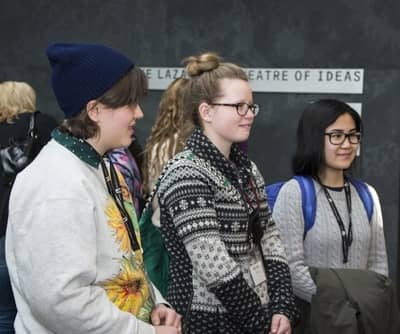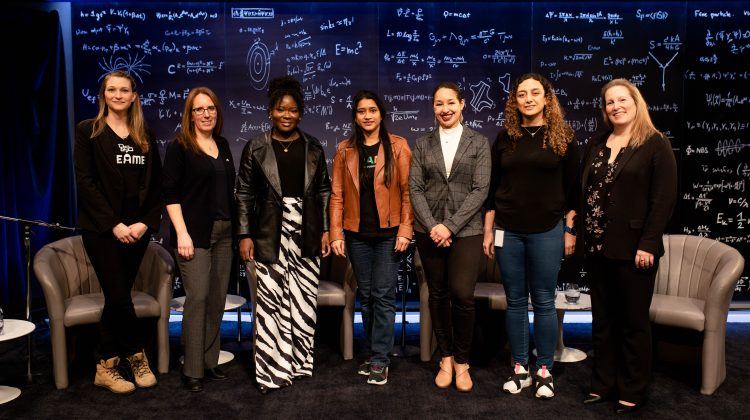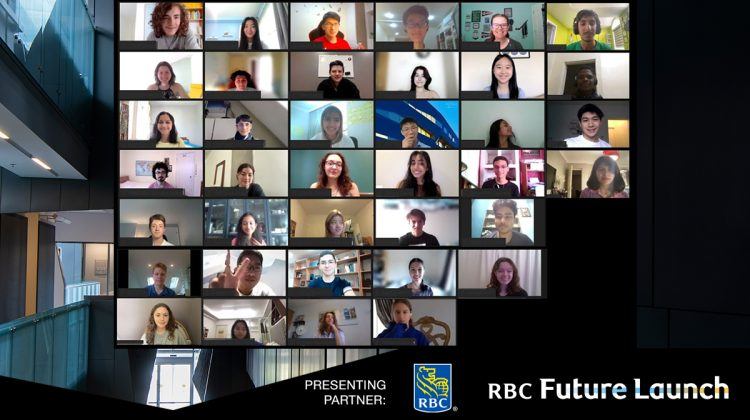Accomplished Women, Inspired Girls
In commemoration of International Women’s Day, Perimeter’s “Inspiring Future Women in Science” conference gave more than 200 high school girls a glimpse into the lives of women in science, technology, engineering, and math (STEM).

The big theatre at Perimeter is packed – but not with the usual mix of researchers in quantum gravity or condensed matter. Today’s audience is not made up of experts, but explorers: young women from Ontario high schools and universities attending Perimeter’s “Inspiring Future Women in Science” conference.
The 200-plus girls have come from all over Ontario to hear speakers, question a panel, participate in mentoring sessions, and – perhaps most importantly – meet scientists, and each other.
“I came here to see what was possible,” says Ghadier Madlol, who got up early to catch a bus from Westminster Secondary School in London. “Before I came, all I knew about science was that you could become a doctor or an engineer, and all I knew about engineers was that they build bridges. But there is so much more!”
Seeing that there’s more – and seeing it early – is important. Women are still the minority in science, particularly in math, engineering, and physics. (New graduates in the life sciences are the exception.) The reasons for that disparity are multifaceted and not fully understood, but one thing that’s clear is that STEM loses girls early. In junior high and high school, girls are already opting out of – or being pushed away from – science and math courses. In doing so, they are closing the door on a vast range of technical or scientific careers.
Perimeter aims to change that. And that’s the point of the “Inspiring Future Women in Science” conference, timed to correspond with International Women’s Day.
The girls are at Perimeter to meet a range of inspiring women, including a video game engineer, a food safety expert, a YouTube star, an education activist, a software engineer at Google – and, naturally, a theoretical physicist.
“Do things outside your comfort zone – that’s where the magic happens,” Rima Brek urges the crowd. Brek, an engineer, is the studio production director at Ubisoft Toronto, which produces such video games as Splinter Cell: Blacklist.
“When I was asked to speak here, I thought, ‘But I really didn’t do anything special,’” says Brek. “I just worked hard like everyone else. But then I realized that I had made a conscious decision, at several points in my life, to push myself, and to refuse to be limited by people’s ideas about my gender.”
“You have to find your voice,” says Dianna Cowern, a physics outreach coordinator at the University of California, San Diego, famous as the creator and face of YouTube’s Physics Girl channel. “I found my science voice by using it more. The best thing to do if you want to find your own science voice is to start speaking.”
Cowern is far in front of the podium, leaning toward the girls in the crowd. “In the beginning, you might not feel like you have anything to say. Your videos or stories or whatever might be pretty bad – mine were – and nobody will listen. And yes, that’s partly because you are a girl. But eventually you might be the leading expert in plasma physics, or in amoebas, and no one will be able to ignore you.”
Sharon Beals, a food safety and quality assurance vice president at Maple Leaf Foods, anchors a panel with fierce and funny gravitas. “Being a girl is not an issue,” she says. “Darn right it isn’t an issue. It’s a strength. Don’t forget it.”
“Be fearless,” says Perimeter’s own Natalia Toro, a faculty member with a research interest in particle physics. “In high school, you have absolutely nothing to lose by pushing yourself intellectually. Take risks. Explore the new stuff now. Find a way to contribute something that is uniquely yours.”
Tehreem Jamal, a Grade 11 student at Assumption College in Brantford, is definitely looking for what she can contribute. She says she knows she wants to be a doctor, but that there is so much more to know: “I’m interested in many things – and I heard many interesting things. It did not help me narrow things down, but that’s okay. Opening things up is good too.”
Roslyn Bern, the president of the Leacross Foundation, a private foundation devoted to changing the lives of women and girls, has advice for girls like Jamal. “Ask yourself: What makes you special?” she says to the crowd. “What can you do? It doesn’t have to be theoretical physics. You’re just one person – but it is your life.”
“If you want to be want to be a woman in STEM, there will be barriers. My job is to take them down,” she adds. “Look around you. Look at everyone here. Remember that you have champions.”
– Erin Bow






















































































